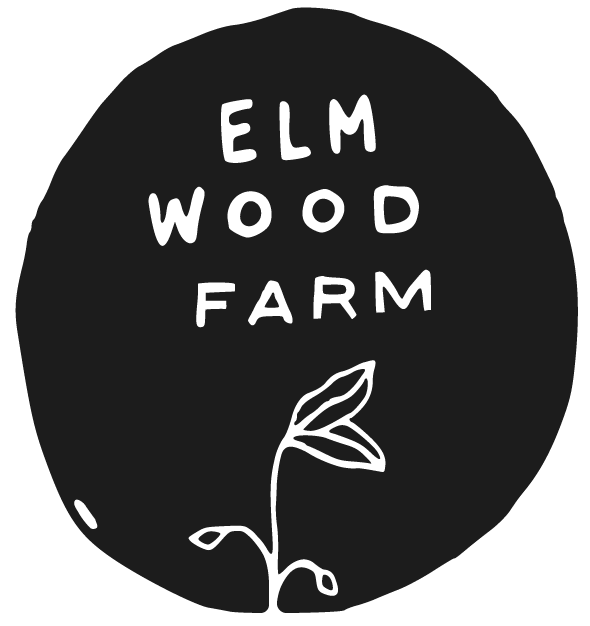Farm Pigs!
…and chickens!
by Eric Nystrom, Culinary (and now, Pig) Director
We have some very exciting news: Elmwood Farm will soon be getting two piglets from a local homesteader to help us cycle nutrients, divert food waste, and build soil health! We are looking forward to having animals on the farm again, and will be adding laying hens later in the Spring as well. The aim is to have them live in peaceful harmony together in the area currently occupied by a bamboo lawn that daddy Panda would be proud of.
Practicing Regenerative Agriculture and Sustainable Urban Farming
Now, hold on. I know we need to talk about the final destination of these pigs, but pause with me a moment. I want to first give some of the “why” in bringing animals into the operation of the farm in the first place. In short: animals are a crucial conduit in converting the solar energy captured by photosynthesis into plant and microbe-available forms. Some of you may be familiar with the term or concept of Regenerative Agriculture or Rotational Grazing, but for those of you who aren’t, the main idea is to manage livestock in such a way as to have a net positive effect on soil health, carbon sequestration, erosion, and nutrient cycling, among other things. Properly managing livestock are rotated regularly on high quality forage so that they mimic natural grazing herds, never staying in the same place too long and causing damage, and never being confined unnaturally and unhealthily in high concentrations. Usually it’s cattle that are rotationally grazed as such, but there is one breed of pig that can be considered a true Pasture Pig: the Kunekune.
Meeting some pure-blooded Kunekunes at Purdon Groves, outside of Corsicana, Texas.
The “Pasture Pig”: There’s Really Only One Breed of Them
Hailing from New Zealand, through careful husbandry, The Kunekune (COO-KNEE COO-KNEE) pig has developed a short and upturned snout and a penchant for grass, legumes, and forbs. The snout is important because it makes it hard for the kunekune to “root”: to tear up the ground looking for grubs, worms, acorns, roots, anything it can eat. Other pig breeds will destroy pasture; however, the Kunekune, when properly managed, will improve it, just as a properly managed herd of cattle will actually increase carbon in the soil and increase the soil health, instead of degrading it.
With all that said… we are not getting Kunes. We are getting Idaho Pasture Pigs. They are a cross between three heritage pig breeds: Kunekune, Berkshire, and Duroc. Kunekune genetics for the grazing snout, Berkshire for the high quality meat, and Duroc for the growth rate and farrowing (mothering instincts). Because they mature more quickly than pure Kunes and produce more meat per pound (the Kunekune is a lard pig), the Idaho Pasture Pig is well-suited to the homesteader. And I like to think of Elmwood Farm as a big urban homestead. We will utilize the “Marvelous Pigness of Pigs” (coinage of Joel Salatin) to our advantage in our Urban Farm context.
Reducing Food Waste and Promoting Conscious Consumption
Pigs and chickens are omnivores, meaning they will eat grass, grubs, meat, food scraps, fruit, vegetables, and all manner of variations thereof. For those of us operating in an urban farm context, the diversity of inputs available is a boon when we do not have acres and acres of pasture land. Our community composting program collects food scraps from neighbors who are helping us divert food waste from going to a landfill. With those food scraps, as well as spent brewing grain from Oak Cliff Brewery, we produce on-site high quality compost, but we can also feed our pigs and chickens, who will then cycle that waste into healthy and local food products in the form of high-quality eggs and pork. It is a sobering experience to take the life of another creature in order to sustain your own, but for those of us who have made the choice to eat meat, there can be no better way to do so than to raise your own animals in pasture, with care and attention, ensuring that they are treated with dignity until the very end. We respect those who decide not to eat meat, but we believe that it is an ultimately positive and responsible process, in which people can play a cultivating role in the overall increase in the richness of our natural and cultural environment. To be able to bear witness to the life and hard work of producing food, we believe, can in turn promote conscious consumption in all areas of life.
This is going to be a grand adventure and learning experience. Come along and join us! I will be asking for volunteers who want to help care for our farm animals, probably something like signing up for a day of the week that you check in and feed and water the animals. Please reach out to me if you are interested!
To anyone who has or will support us in building this space to gather as a community and learn, thank you,
Eric Nystrom
erictnystrom@gmail.com
817.781.9826



